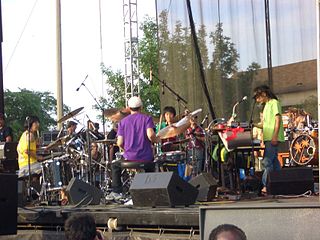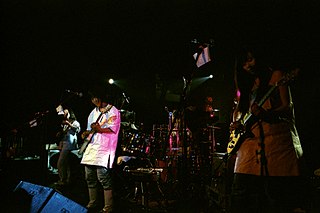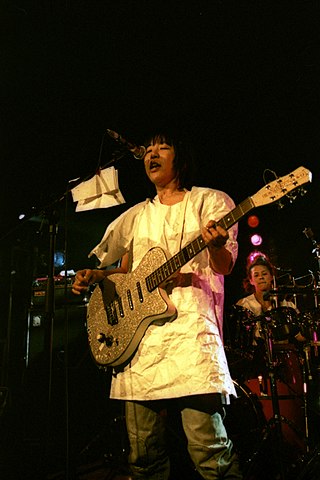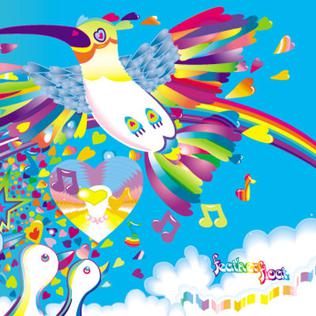
Stereolab are an Anglo-French avant-pop band formed in London in 1990. Led by the songwriting team of Tim Gane and Lætitia Sadier, the group's sound features influences from krautrock and 1960s pop music, often incorporating a repetitive motorik beat with the use of vintage electronic keyboards and female vocals sung in English and French. Their lyrics have political and philosophical themes influenced by the Surrealist and Situationist movements. On stage, they play in a more feedback-driven and guitar-oriented style. The band also draw from funk, jazz and Brazilian music, and were one of the first bands to be dubbed "post-rock".

Yoshimi Battles the Pink Robots is the tenth studio album by American rock band the Flaming Lips, released on July 16, 2002, by Warner Bros. Records. The album saw the band pursue a more electronic direction than previous efforts, incorporating acoustic guitars and rhythms influenced by hip hop and top 40 music. The album was well-received critically and commercially, helping the band break into popularity, and was adapted into a musical in 2012. In 2022, the band announced a 20th anniversary box set version of the album and that they would perform the album in full twice in early 2023.

Boredoms is a rock band from Osaka, Japan formed in 1986. The band's sound is often referred to as noise rock, or sometimes Japanoise, though their more recent records have moved toward repetitive psychedelic rock, ambient soundscapes, and tribal drumming.

OOIOO is a Japanese experimental rock band. The four-piece ensemble was founded by Yoshimi P-We, the drummer and occasional trumpeter for Boredoms. The band's origin lie in a photo shoot that Yoshimi was asked to do for a magazine. She invited a few of her friends to join her, and they created a fake band for the shoot, which they later decided to make real. The band quickly gained attention by being the opening act for Sonic Youth in 1997 on their Japan tour.

Yoshimi is a Japanese musician best known for her role as the longest consistent drummer in the Japanese rock band Boredoms.

Kila Kila Kila is the fourth studio album from the Japanese rock band OOIOO, originally released in 2003 in Japan. It was later released in America on February 17, 2004, the band's first album released on Thrill Jockey.

Dr. Dog is an American rock band based in Philadelphia, Pennsylvania, United States. Its lineup consists of Toby Leaman, Scott McMicken, Frank McElroy, Zach Miller (keyboard), Eric Slick (drums), and Michael Libramento. Lead vocal duties are shared between Leaman and McMicken, with all members contributing harmonies. In addition, each band member has a nickname beginning with the letter T, and they have explained that friends of the band also receive nicknames, which are drawn from aspects of their lives and personalities.

Boris is a Japanese band formed in 1992 in Tokyo and composed of drummer Atsuo, guitarist/bassist Takeshi, and guitarist/keyboardist Wata. All three members contribute vocals. Boris has released more than twenty studio albums on various labels around the world, as well as a wide variety of live albums, compilations, EPs, singles, and collaborative albums. They have collaborated with acts such as Sunn O))), Merzbow, Keiji Haino, and guitarist Michio Kurihara.

Frustration Plantation is the fourth studio album by American rock band Rasputina, released by Instinct Records on March 16, 2004. While not strictly a concept album, Frustration Plantation does have many songs darkly relating to women's lives in the Old South.

I Am the Resurrection: A Tribute to John Fahey is a tribute album to guitarist John Fahey released in 2006. The album's title is taken from the title of the third track of his album The Transfiguration of Blind Joe Death.

Eye Remix is EP of remixes by the Japanese band OOIOO by Boredoms member Yamantaka Eye. Originally handed out while touring in the US for the Taiga album, the EP contains two remixes by EYヨ using two Taiga tracks as source material.
Metalchicks are a Japanese rock duo supergroup. Their second album, St. Wonder, was the soundtrack to the 2006 film Warau Michael. Metalchicks also composed the soundtrack of anime series Heroman. The group regularly performs in Japan, and played at SXSW 2007 in the United States.

Armonico Hewa is the sixth studio album by Japanese experimental rock band OOIOO. It was released on August 5, 2009 by the labels Commmons and Shock City.

Gold and Green is the third album by the Japanese band OOIOO, a side-project of Boredoms member Yoshimi P-We.

Feather Float is the second album the Japanese band OOIOO, a side-project of Boredoms member Yoshimi P-We.

Prowl is a 2006 album by cellist Erik Friedlander performing his compositions with the quartet that previously appeared on Topaz which was released on the Cryptogramophone label.

Konoyo is the ninth studio album by Canadian electronic music musician Tim Hecker, released on September 28, 2018 on Kranky and Sunblind Music. A majority of the album was made from Hecker's visits to Japan, where he worked with a gagaku ensemble, Tokyo Gakuso, in Jiunzan Mandala-Temple Kanzouin on the outskirts of Tokyo.

American Dollar Bill – Keep Facing Sideways, You're Too Hideous to Look at Face On is a collaborative album between Japanese free improvisation/noise music artist Keiji Haino and American post-metal band Sumac. Serving as Haino's 86th and Sumac's third studio album, American Dollar Bill was released on February 23, 2018 through Thrill Jockey.

Juice B Crypts is the fourth studio album by American experimental rock band Battles, produced by Chris Tabron, and released through Warp on October 16, 2019. It is the band's first album as a duo, following guitarist/bassist Dave Konopka's departure in 2018.

In the Meantime is the third studio album by Canadian singer and songwriter Alessia Cara, released on September 24, 2021, by Def Jam Recordings. Cara collaborated with Jon Levine, Salaam Remi and Joel Little among several other producers on the project. Deemed as a concept album based "In the meantime between life and death", the album unravels the anxieties of introspection, healing, love and self-reflection.



















